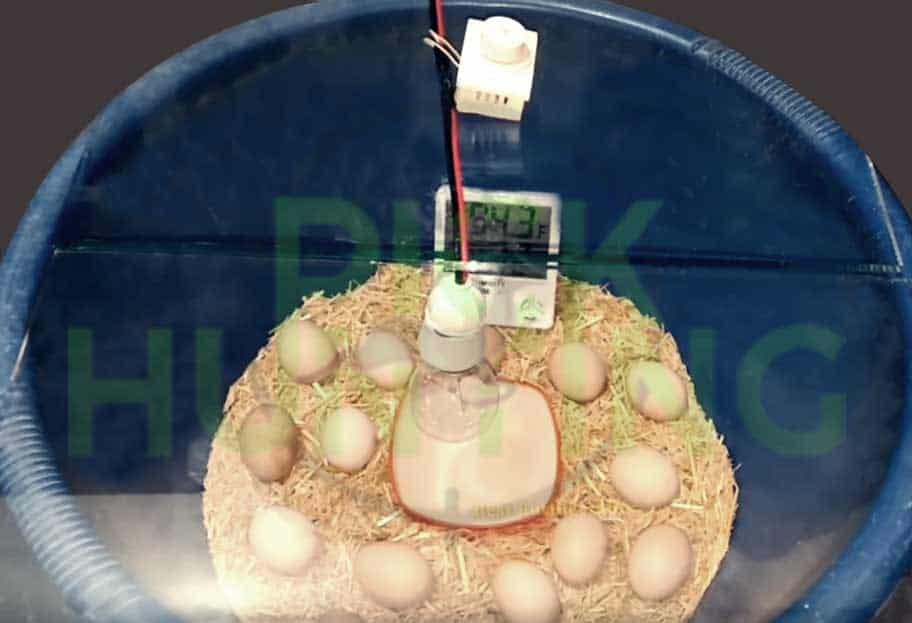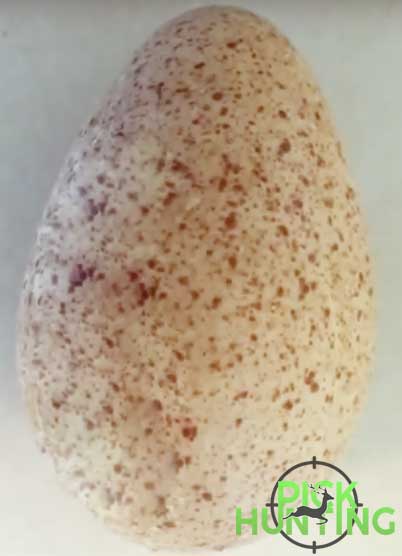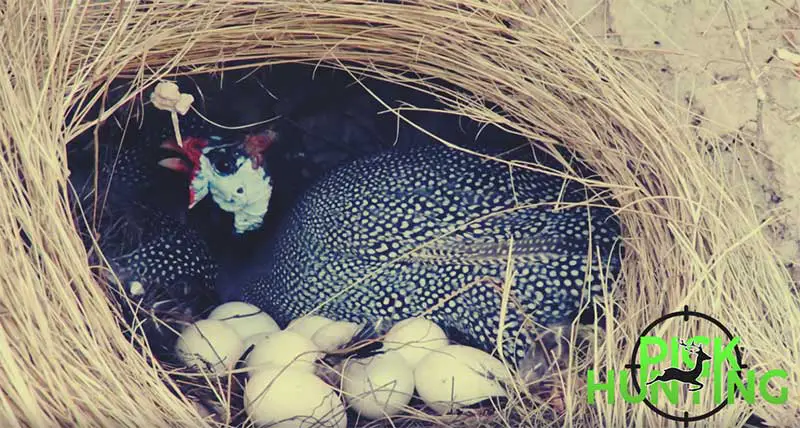Have you ever tasted turkey’s meat?. Well, the majority would say YES it is delicious and tender!
But what will be the answer if you ask people?
Have you ever tasted turkey eggs? No, Not at all. Many of us will say they never cooked it. They would even say they don’t whether turkey lay eggs or not. So, let’s discuss more –
Do turkey lay eggs or not? Yes, turkey hens lay eggs. However, the amount of eggs laid by wild hens is different from eggs of domestic hens. Wild hens would lay about 8 to 14 eggs per year in spring. Domestic hen lay 4 to 17 eggs. The number of eggs and frequency of eggs depends mainly on feed as well as the health of the hen.
Turkey eggs are harder and bigger in size than that of a chicken egg. It is very expensive. For this reason, it is unpopular. Let’s move on to know more facts.
Table of Contents
What time of year do turkeys lay eggs
Both wild and domestic turkeys start laying eggs in March and April. This time is the peak Spring season which is best to heat up hens. This bird is sensitive and can’t bear cold weather. However, in the coldest zones, this period may extend up to the end of April. In America, peak springtime is March. So, mating occurs at the start of March. After this, she went off searching hidden places for nesting. About 4 weeks after mating hen would start laying eggs.
How do turkeys fertilize eggs
In turkeys, eggs fertilize after mating. For this purpose, male turkey throw sperms in the hen’s oviduct to fertilize eggs. These eggs will be laid up to 4 weeks after mating. Typically, only one-time mating is enough for breeding. The same happens with domestic turkeys. Interestingly, only one tom can fertilize up to 10 hens. Let’s watch a video of turkeys mating.
Wild turkey hens heat up eggs for 28 days. However, poultry breeders fertilize hen eggs in incubators.
Hatching turkey eggs naturally
Wild hen hatch eggs in a natural setting. At first, she starts building a nest with mulch or straws on the ground. For this, hen mostly chooses densely planted hot areas. After 4 weeks, she lays 10 to 12 eggs within a two-week duration. Hen turkey sits on eggs right after the last egg is laid. She would hardly leave the nest for more than one or two hours until 28 incubation days. During this period, she would keep on rotating eggs regularly to heat them from all sides. It will take 4 weeks to get the eggs to hatch naturally. The incubation period of domestic turkey egg hatching is also the same as 28 days. However, it takes place in the incubator. Try this all in One egg incubator for successful hatching.
Turkey egg price
Turkey hens don’t lay enough eggs to be sold in markets. That is why they are very expensive. In America, some breeders sell turkey eggs from 4$ to 5 $ per egg. But there is no cost regulatory authority to fix price. While dozens of chicken eggs cost only 1.61$.This is because people prefer chicken eggs over turkey eggs. However, in most turkey inhabiting countries, eggs are used for hatching not for sale. Buying these eggs from far off places is not good for safe delivery. So, always prefer local breeders if you want to get them.
Turkey incubation period
The incubation period of both wild and domestic turkey is the same 28 days. Wild hens sit on eggs to heat them for 28 days. During this period, she keeps on turning sides of eggs regularly. Usually, she incubates eggs from 18 to 23 hours in a day. She only goes for feeding then returns back to the nest. However, in incubator machines, poultry workers keep the temperature under control. But they also turn eggs three times a day. After 28 days, the egg starts hatching gradually and you can hear chips of chicks. Let’s see an interesting video of Hatching turkeys.
How to hatch turkey eggs without an incubator
Do you want to hatch turkey eggs and you can’t afford an incubator? What to do now? No need to worry about it. We have a solution for you!. You can manage your own homemade incubator to do this. For this, you need simple household items. Take a bulb or heat lamp, plastic bin with lid, mulch or straws or lemongrass, a cup of water for moisture. Fill the surface of a bin with mulch and place a cup of water over it. Place a digital temperature and humidity thermometer inside the bin. Spread the eggs over the mulch. Install a 60W bulb so that its light shed directly on eggs. Finally, cover the lid with glass. Keep on rotating eggs three times a day. It will take 21 to 28 days to hatch them. If not, wait two or more extra days.

What color are turkey eggs
Hen Turkeys lays pure, creamy or peachy white pointed eggs every year in spring
The color of turkey eggs is white, off white or creamy white. Each egg has brown speckles on its outer shell. However, the number of these speckles varies from hen to hen. These eggs are browner and larger than chicken eggs. Egg yolk is relatively dark yellowish as compared to a chicken egg.

How to tell if turkey eggs are fertile
You can tell if the egg is fertile or not by a simple experiment. Hold up the egg in flashlight or candlelight in your hand and observe carefully what you see inside the shell. If the egg is fertile, you will see the visible networks of blood vessels present, an opaque shape of an embryo at the wider end of the egg. If it is about to hatch you can even observe the movement within the egg. But be careful, don’t hold it tightly.
How often do turkeys lay eggs
Turkeys don’t lay as many eggs as other game birds do. It mainly depends on species, health, and feed of hen. A wild turkey hens lay eggs only one time per year. She would lay one clutch of the egg once in a year during spring. Usually, a hen lays two eggs per week. So she takes about 4 weeks to lay 8 to 10 eggs. Wild turkey will not lay eggs again after hatching. Domestic turkey lay eggs constantly prior to September. This is because she doesn’t incubate eggs as wild hens do. Though turkey can fly but they use a specific place to lay their eggs.
How many eggs do a turkey lay
The number of eggs laid by wild turkeys is different from the eggs of domestic turkeys. Wild hens can lay 8 to 15 eggs in spring every year. If she incubates them she would not lay eggs until next spring. However domestic turkeys can lay 4 to 17 eggs. But this is not the exact number. It may vary with conditions like the health of hen, weather and many more. It can even lay as low as 4 eggs and as large as 17 eggs. Wild turkey’s successful hatching ratio is low as compared to domestic turkeys.
Where do turkeys lay their eggs
Female turkeys start planning for eggs after mating. She scratches ground or places under deep bushes. Before laying eggs she gathers mulch, straws or twigs and makes a nest deeper on the ground. She chose a safe place for laying eggs. Snakes often harm eggs of turkeys. She stays in this nest for about 28 days until the eggs hatch.

Are turkey eggs edible
Yes, they are a hundred percent edible and highly nutritious. But it is very expensive to buy. You may cost 4 to 5$ per egg. Turkey egg yolk is deep yellow as compared to a chicken egg. You can make it complete for your breakfast. Here is a recipe for cooking this egg simply. However, it’s a bit smelly. Don’t use it for baking.
Frequently Asked Questions (Faq)
Do turkeys lay eggs or give birth?
Turkeys lay eggs and never give birth. Hens lay approximately 8 to 15 eggs never give birth.
Where do turkeys lay their eggs?
Hens make nests with straws and feathers little deep in the ground under bushes. They lay eggs in this nest.
Can you eat a turkey egg?
Yes, turkey eggs are edible. You can eat without any hesitation.
How many eggs does a turkey lay before she sits on them?
A domestic hen can lay 4 to 17 eggs whereas wild turkey will lay 8 to 15 eggs depending on factors like the health of hen, feed, and weather.
Final Words
This article covers all topics related with turkey eggs and you already got the answer that do turkey lay eggs or not. If you are interested in farming this game bird, don’t hesitate. You can raise by even hatching eggs without an incubator as shown above in the article. Both meat and eggs of turkey are delicious. By constant care and proper feeding , you can get more eggs and more chicks.

![Do Turkeys Lay Eggs? [New Secret Info & Facts Revealed]](http://ws-na.amazon-adsystem.com/widgets/q?_encoding=UTF8&ASIN=B00GS9ZSOK&Format=_SL250_&ID=AsinImage&MarketPlace=US&ServiceVersion=20070822&WS=1&tag=huntingluck-20&language=en_US)
